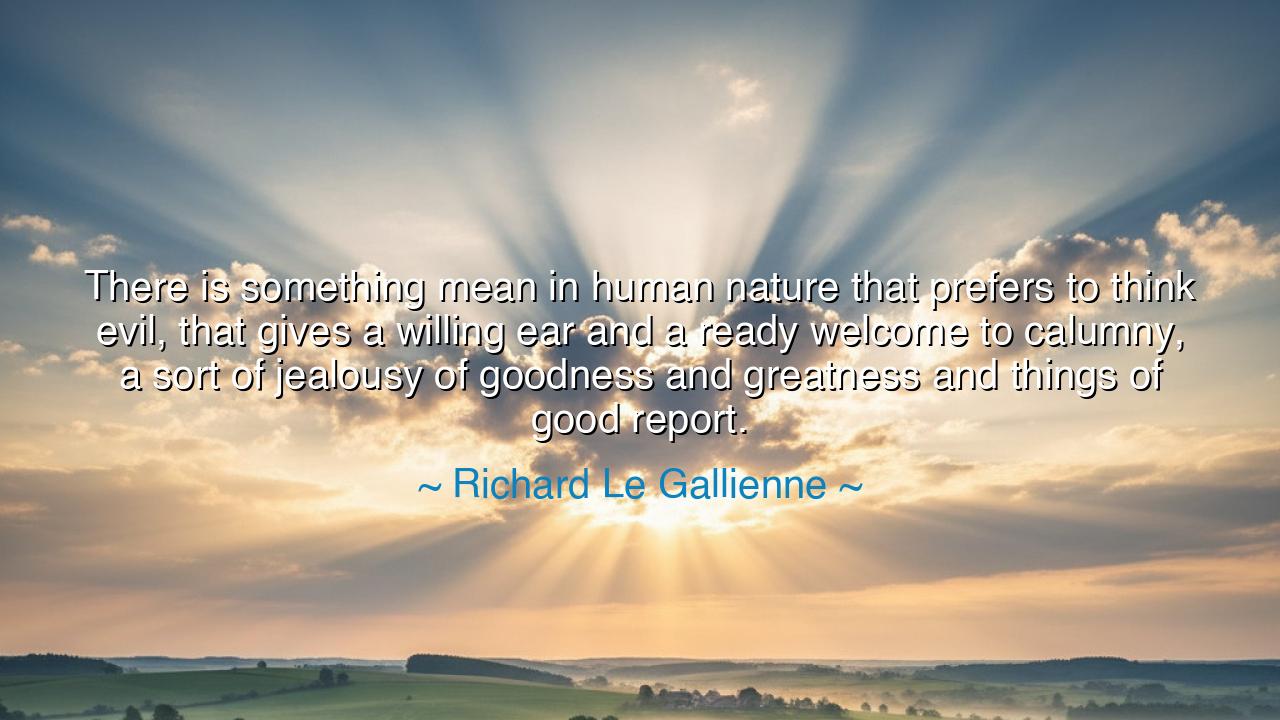
There is something mean in human nature that prefers to think
There is something mean in human nature that prefers to think evil, that gives a willing ear and a ready welcome to calumny, a sort of jealousy of goodness and greatness and things of good report.






In the profound words of Richard Le Gallienne, the poet and critic of the Victorian age, there resounds an ancient lament for the flaws of the human heart: “There is something mean in human nature that prefers to think evil, that gives a willing ear and a ready welcome to calumny, a sort of jealousy of goodness and greatness and things of good report.” These words strike not only at the vanity of individuals but at the very sickness that has haunted mankind since its beginning — the jealousy of virtue, the envy of light by those who live in shadow. Le Gallienne’s insight, though spoken in a gentler century, pierces across time with undiminished truth: that within each of us there is a low whisper, a craving not only to see greatness but to see it fall.
This quote was born of Le Gallienne’s deep observation of human nature and society — a society that, even in its refinement, often delighted more in scandal than in sanctity, more in the fall of the noble than in the triumph of the just. To “prefer to think evil” is not merely to suspect wrongdoing, but to find satisfaction in it — to draw a grim pleasure from the thought that the pure are not truly pure, that the mighty are secretly corrupt. It is the jealousy of goodness, the resentment that arises when others’ light exposes our own dimness. This meanness, as Le Gallienne calls it, is the small and cowardly part of the soul that finds comfort not in climbing higher, but in seeing others brought low.
The ancients understood this sickness well. The Greeks called it phthonos, that corrosive envy which even the gods feared. It was phthonos that stirred the people of Athens to condemn Socrates, the wisest among them, for daring to live a life of integrity too pure for their comfort. They whispered calumny — lies cloaked as suspicion — until the philosopher was forced to drink the hemlock. And so, humanity’s jealousy of goodness and greatness destroyed what it could not imitate. From this ancient tragedy to the slanders that still fill our modern tongues, Le Gallienne’s words ring as a mirror — showing us how little we have changed.
There is something paradoxical in the human heart: it admires what it envies, and envies what it admires. We gaze upon the virtuous, the gifted, the successful, and feel both reverence and resentment. Instead of asking, “How can I learn from them?” we ask, “Who are they to be better than I?” And so we become eager hearers of gossip, quick spreaders of calumny, willing servants of that mean-spirited impulse that delights in tearing down what it cannot reach. To destroy another’s reputation is, for a moment, to feel powerful — yet in truth, it is to confess our own weakness.
Consider the life of Joan of Arc, the peasant girl who rose by faith and courage to lead a nation. Her purity, her strength, her unwavering belief struck awe in her allies — and jealousy in her enemies. Even those she fought for began to suspect her, to whisper that her holiness was a mask, her strength a trick. The same people who once called her a saint soon called her a witch. And so she was betrayed, condemned, and burned. But her persecutors could not destroy her greatness — only reveal their own meanness. Their jealousy of goodness could not dim the light that history would later call divine.
Le Gallienne’s words are thus not an accusation, but a warning — that the instinct to think evil is not only destructive to others, but to ourselves. Each time we indulge in gossip, in suspicion, in joy at another’s downfall, we shrink our own soul. To resist this meanness is to perform an act of courage, for it is easier to sneer than to honor, to criticize than to emulate. Yet the wise understand that greatness in another does not diminish us — it calls us higher. The good, the noble, and the successful are not our rivals, but our reminders of what is possible when envy is silenced and virtue is pursued.
The lesson, then, is this: guard your heart against the pleasure of calumny. When you hear ill spoken of another, ask yourself — do I rejoice because I believe it, or because I want to believe it? Train your soul to delight not in failure, but in goodness. Praise the noble, even when you cannot match them. Defend the absent, even when others attack. And when you see greatness, rejoice that it exists in the world, for in honoring it, you draw yourself nearer to it.
So, my listener, remember the wisdom of Richard Le Gallienne. There is indeed “something mean” in our nature — but there is also something divine. The mean spirit envies; the divine spirit admires. Choose, then, which part of your soul you will feed. Turn your ear from slander and your heart from envy, and you will find that goodness no longer provokes you — it inspires you. For only the small fear greatness; the great rejoice in it. And thus, in overcoming jealousy, you become part of the very goodness and greatness the world so often envies but so rarely understands.






AAdministratorAdministrator
Welcome, honored guests. Please leave a comment, we will respond soon